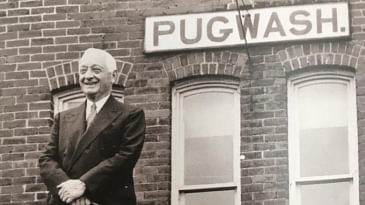Welcome to the My Nuclear Life podcast! In this episode, host Shelly Lesher speaks with Don Howard, a professor in the University of Notre Dame’s Department of Philosophy - and one with whom she has collaborated in the past in her own teaching! Don is a fellow and the former director of the university’s Reilly Center for Science, Technology, and Values, and he now co-directs the center’s Ethics of Emerging Technologies focus area. His expertise intersects at many points with the field of physics, and he joins Shelly today to consider questions of scientific ethics that have arisen through the development and implementations of weapons of mass destruction.
While the common assumption pre-WWII was that the place of scientists in relation to ethical concerns was merely to provide technical answers to technical questions, the atomic bombs developed during the Second World War incited debate about the role of scientists in matters of ethics and policy. The Franck Report, produced by scientists of the Manhattan Project, argued that scientists had by virtue of their technical expertise a moral obligation to insert themselves into relevant policy debate. Not all agreed with the conclusion; scientists such as Oppenheimer resisted, as did some military leaders.
Other horrifying weapons had been used in the past - even weapons unable to discriminate between civilians and military targets. The atomic bomb raised an unprecedented amount of ethical debate, though, because it was unique in the scale of destruction it represented. Few scientists working on bomb development actually abandoned their work because of this debate, though. As work on atomic and then hydrogen bombs developed, scientists were driven by the technical challenge before them, profound fear of the Soviet Union, and other factors.
On the other hand, scientists led the way in both movements to promote public education and efforts for disarmament (resulting, in part, in the Limited Nuclear Test Ban Treaty). And ever since, there have been examples - such as CIFS - of scientists taking up not only technical, but also ethical questions about their work. As educators, Don and Shelly specifically try to equip students in the area of morality, and fortunately, it seems that the up-and-coming generation of young scientists has a keen interest in the ethical side of their work.
Links:
Learn more about Don Howard.
Send an email to My Nuclear Life or visit their website.
My Nuclear Life now has a Patreon page, where you can subscribe for bonus content!
Please leave a 5-star review on iTunes and subscribe to My Nuclear Life wherever you listen to podcasts. As the new season gets underway, watch out for new episodes every other Tuesday
Production costs for this episode were provided through National Science Foundation Grant PHY-2011267.





